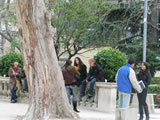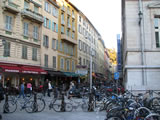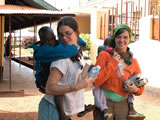|
|
|
|
...In Quito, as in every other Latin American city, the best way to find a Spanish school is to check the message boards at the hostels, or to ask the staff. Finding the major hostels is fairly easy: simply search websites such as www.hostelworld.com. Using these websites is also useful to the traveler whose schedule changes often and who does not wish to book in advance. You can go onto the websites and research average prices before arriving in a city to ensure that you get a fair price. Knowing the average price also gives you bargaining leverage if you end up in a hotel during low season and the tenants are flexible.
The hostels often have business relationships with the Spanish schools and will be eager to point you in the right direction. Spanish classes cost between four and ten dollars an hour, depending on how long you plan to study and the reputability of the school. Many of the newer or smaller schools have significantly discounted prices because they do not yet have the reputation of the larger schools. Many will offer extra incentives, such as cultural tours, salsa lessons, or even offer classes at jungle lodges in the Ecuadorian rain forest. Schools include: Colonial Spanish School and The Quito Spanish Institute. Quito is a terrific place to learn because almost nobody speaks English...
Read more...
|
|
|

|
If anyone had told me that one day I would spend four months in Bath, England, I would have been sincerely surprised. As a pre-Medical student, studying abroad was more of a distant fantasy than an attainable reality; I imagined that my many science requirements and entire application process would be major obstacles to traveling overseas. Additionally, I had already been to England once, and while I enjoyed it very much, it just did not seem to be an exotic land - especially when compared to the stories of Africa and India shared by fellow students...
Read more...
|
|
|

|
To be honest, I was initially skeptical about studying abroad.
Everyone I met who had studied abroad previously insisted it was “the best experience of their life,” but I was positive I would be the one person who would have a less than delightful time.
Fortunately, I was wrong... Studying abroad in London gave me the chance to explore much of Europe including Italy, Scotland, France, Belgium, and the Netherlands...
Read more...
|
|
|

|
Studying abroad in Europe does not mean staying in one city. Due to weekends and holidays, a summer or a semester abroad allows opportunities to see several countries outside of your home base. With many European countries in such proximity, it is easy to visit several in a few months. The trick is to find out the most enjoyable and practical way for you to travel. I recently spent four months in Rome. During that period I was able to travel to eight countries in Europe. Along the way, I learned some helpful tips that should help make your side trips as a student a bit easier...
Read more...
|
|
|

|
Sea, sun, great food, and lots of fun. Sounds like a summer beach party, but these words could also describe learning French in Montpellier. In southern France, just 20 minutes in from the Mediterranean coast, Montpellier prides itself in being one of France's fastest growing cities, attracting 4,000 new inhabitants per year. One French student even called it "THE southern French city where the living is good." And with its 300 sunny days per year, modern transport system, and active cultural life, who is to argue?
The concentration of language schools and dynamism of its student population make Montpellier the perfect destination apprendre le français, as the city calls itself. But as a former student at Accent Français points out, what also makes Montpellier a great place to study French is the local population's sensitivity to language learners — they will politely correct you, not automatically switch to English after hearing your accent-laden bohndjoor, and be patient as you try to use your newly learned vocabulary...
Read more...
|
|
|

|
...Having now seen Vitorchiano myself, I would say that when Ms. Lappin set about to unify that spirit of place with the writer’s spirit, she succeeded when Centro Pokkoli was born.
“I helped create the writing center and retreat at Centro Pokkoli, with encouragement from friends of the Geneva Writers Group,” to make a place where other writers could meet, exchange, and learn from each other. Our original idea was to host writing workshops and writing groups, but we have also organized theater events, art shows, art workshops, and Italian culture and language seminars,” says Lappin...
Read more...
|
|
|
...At the university, I chose to take classes that would help me learn more about Australian culture, such as courses in Australian literature and Australian marine life. As an English major, I found the Australian literature course very interesting and informative. While early American literature courses consist of captivity narratives and stories told in the Puritan tradition, Australian literature focuses on the Aboriginals and the consequences of being a colonial nation. The Australian marine life course offered students studying abroad in Australia to learn about wondrous habitats, such as the Great Barrier Reef, the many rivers and estuaries, and the native animals that inhabit these places...
Read more...
|
|
|

|
...Too often I hear stories from my friends returning from abroad having spent their semester haunting the local bars with their American friends, living in the "international" dormitory and generally experiencing America on foreign soil. What follows are some tips on how to make the most of your study abroad experience, whether you are in Rome, Quebec, Qingdao, or Auckland. My own memorable experience involved studying at the University of Queensland (UQ) in Brisbane, Australia. Follow my advice and you should truly experience your new home in depth, make lifetime friends in another country, and see things to which your fellow students might have been blind...
Read more...
|
|
|

|
...Living in a new culture does not guarantee your acquisition of the language. For those who do not have the opportunity for immersion language studies but find themselves working or living abroad for another purpose, the desire to learn the native language can be quite intense. After all, what better time to pick up a new language and at the very least impress friends back home, right? However, we may mistakenly believe that language-acquisition might occur by osmosis — by simply placing ourselves in that culture. We may assume that that the hard part is the life-adjustment and actual moving process. Finding yourself in a position to learn in this way, no matter what the overall purpose of your journey, can certainly improve our opportunities to practice. Unfortunately, after moving to a new country, you must still make the daily decision to actually speak the language...
Read more...
|
|
|

|
Individual efforts, student-initiated programs, and university-sanctioned experiences offer international service opportunities for everyone...
Read more...
|
|
|
|
Deciding where to study abroad is both an exciting and challenging step. You have a lot to consider, from local culture to the cost of living. While a recent shift shows many students are exploring new destinations for their time abroad, traditional cities such as Paris remain popular for their perfect blend of prominent local culture and international atmosphere. If Paris is on your list as a place to visit, here are some tips from Study Abroad Paris, a guidebook for getting you started on an exciting, overseas adventure...
Read more...
|
|
|
Multiple kanji readings, perplexing particles, three alphabets.yes, the Japanese language is a tricky one. The most effective way to cross the language divide is to pack your bags and head to Japan for full immersion; once there, regardless of your level of fluency, you are sure to be chin-deep in opportunities to practice speaking Japanese because most locals speak little English. Add to this, the culture of "saving face" where communication hiccups are met not with impatience but graciousness. Could you possibly find a more conducive place for language learning?
Read more...
|
|
|
As dawn's first rays of light slice through the lush foliage outside her window, Tracy Monique Botero rouses from her dorm bed. She needs a flashlight to find her bicycle in the semi darkness and on the way surprises a giant anteater and a family of peccaries that makes its home not far from her cabin. She is one of the thousands of students pursuing graduate and undergraduate studies in the middle of a rainforest. Their campus is the La Selva Biological Station situated in an old-growth forest in the Caribbean lowlands of Costa Rica...
Read more...
|
|
|
In the late 1990s each state had only a few colleges offering MFA in creative writing programs, and many novelist wannabes applied for those highly coveted spots. However, after the internet boom, writing degrees offered
online by traditional colleges with lower tuition fees came into being, and the Low Residency Abroad programs emerged.
“Low-res” means students and instructors convene for week-long residencies, allowing bonds and friendships to develop, so these literary gatherings of intensive workshops feel more like fun-filled getaways. Usually
they’re held once in winter and once in summer; between seasons, the online work is done. Most MFA in creative writing schools only have the academic get-togethers on American campuses. However, now some writing residencies are done overseas...
Read more...
|
|
|
|
|
|
Moving abroad for a language course or university study is usually for a shorter duration than living overseas for employment, business, or retirement, but students still face many of the same issues and challenges. The main difference is that as a student, the process of settling in and adapting to a host country takes up a significantly larger portion of your time overseas than as a long-term expatriate. I have met many language and university students who had to return home just as they were getting comfortable living overseas. To ensure that you get all the support you need as a student to help you quickly adapt to your host country, it is important to prepare well and research all the program details before signing up...
Read more...
|
|
|
|
|
|
...There are few places on earth that serve as a better place to learn to cook than France. The nation elevates cooking and eating to an art form which is practiced as a ritual on a daily basis. Immersing yourself in French culture through a cooking or wine class is a great way to travel, learn and enjoy the culinary delights of France...
Read more...
|
|
|
|
|
|
There is something hopelessly romantic about the idea of becoming a modern-day nomad. Who among travel aficionados would not swap a short vacation and a looming return flight for the ability to wake up each day in a new location? Goodbye cubicle, hello freedom.
While it is true that existing as a hobo can be hugely freeing and rewarding, giving up familiar surroundings and routines for a life on the move can be a more difficult transition than it first appears. There are a host of practical and emotional aspects to consider...
Read more...
|
|
|
|
We are proud to launch TAzine as a monthly Webzine which continues the 31-year tradition started by Transitions Abroad magazine. TAzine features many of the same columnists who wrote for the magazine, a growing group of new columnists, while featuring many freelance writers who wish to share their experiences and expertise within the context of our innovative alternative coverage of work, study, travel, and living abroad.
Founded in 1977 by Dr. Clayton Allen Hubbs, Transitions Abroad magazine was the only print publication dedicated to work, study, living, volunteering, and immersion travel abroad. Its purpose — in print and now as a Webzine — is the dissemination of practical information leading to a greater understanding of other cultures through direct participation in the daily life of the host community.
|
Current Issue and Focus
Study Abroad and Educational Travel
|
Previous Issue and Focus
Narrative Travel Writing and Cultural Travel
|
|
|
|
|
To view all TAzine back issues, see our archive.
|
|
|
|
